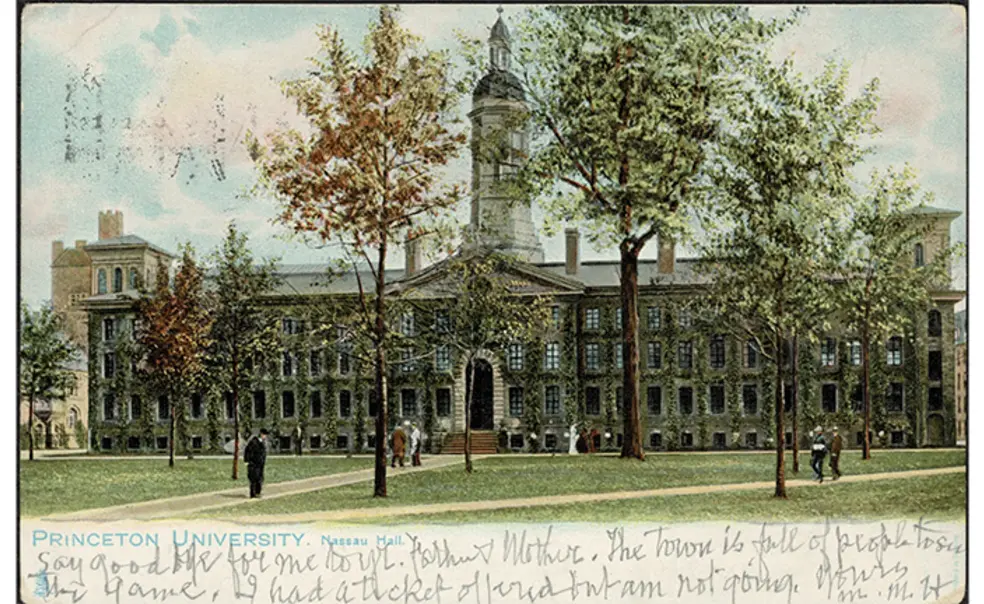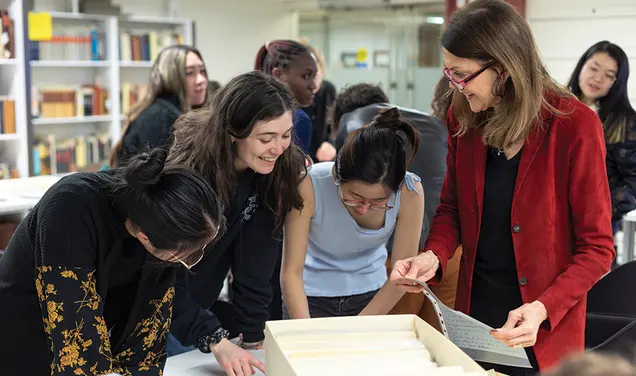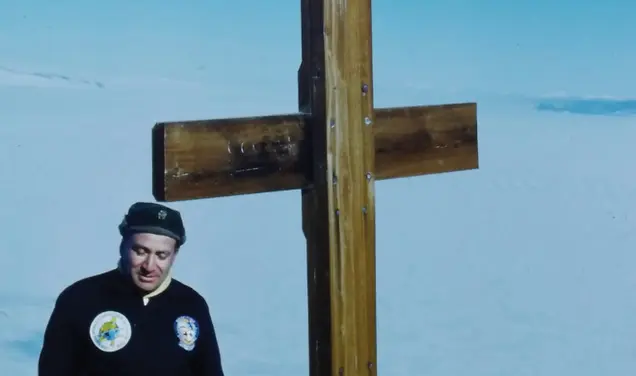Rally ’Round the Cannon: Missing Milestones
“This is a very fragile world, and we need to remember that.”
Tradition is not the worship of ashes, but the preservation of fire. — Gustav Mahler
In the event you, the Avid Historian, become quizzical as we continue, be assured this is indeed the regular summer-long column wherein we commonly tie the developments of the recent Reunions and Commencement season to important events in the University’s history and its related role in the world beyond. By way of that description, you see the impediments of the current situation; the only way to even approximate Reunions during this vicious pandemic is to Zoom with 25,000 people (which seems to be what some cabin-fevered folks are actually attempting in desperation), a melancholy concept even before you realize you still have to buy your own beer.
So it seems high time to suck it up, pretend bravery, and pursue the mature person’s approach to such gut-wrenching circumstances. It’s time for fantasy.
One of my favorite fictional characters is Q, the virtually omnipotent extraterrestrial with something of an inferiority complex (as you might imagine, a suboptimal combination) who first intrusively appears in the pilot episode of Star Trek: The Next Generation and then again, to the plaudits of no one, ever, across years of the various Trek franchise series. Portrayed by the sly, suave John DeLancie, Q reaches the zenith of his obnoxious career in the final two-hour episode, “All Good Things…,” deceiving Patrick Stewart’s stalwart Jean-Luc Picard into jeopardizing the very existence of the universe — of course — as yet another test of humankind’s mettle. The means of this challenge is to bounce Picard back and forth among three different points in time on the trusty USS Enterprise 1701-D, allowing him to solve a mystifying paradox… or not, although a resulting galactic incineration might have proven a bit of a shock to the fanbase.
So it’s suddenly now a pristine Saturday on the front campus, April 3, 1880. There is a crowd, which is curious on this least structured of student days. It’s clear they aren’t headed to town, but instead down between Nassau Hall and the library, then east beside East College and over toward Washington Road. The conversation on the way to what turns out to be the opening game of the baseball season down at the end of Prospect Avenue revolves around the Tiger nine, reputedly the best ever (i.e. 17 years), the worrisome issue of the 50-cent admission charge, and the resulting need for student season tickets so that the undergrads can attend more than a few games each.
But as we turn, the buildings change and we are walking into Dillon Gym at 7:45 p.m. on March 14, 1970. We have fabulous front-row bleacher tickets to a kickass Chambers Brothers concert (for $4.50); the climactic performance of their one megahit, “Time Has Come Today,” is not the three-minute Top 40 chart version, not the 11-minute album version, but 17 minutes of throbbing R&B, reminding us “the rules have changed today” and cementing their reputation as a great show band. Twenty-five-year-old dust is still filtering down from the “acoustic” ceiling as we stand cheering with the tie-dyed audience.
And now we are somehow in the south stands at Jadwin Gym, applauding wildly before the Yale game for women’s basketball seniors Taylor Baur ’20 and Bella Alarie ’20 (All-American and surefire WNBA draft choice). It’s senior night, Feb. 29, 2020, and as a Sadie Hawkins Day tribute they’re playing their final home game for the Tigers. They have a career record of 88-31 overall, 52-10 against the Ivies, 40-11 at Jadwin, three Ivy Championships, and are surely headed in two weeks to their third Ivy Tourney win and trip to the NCAAs. As we sit, astonishingly the chatter turns away, to their fellow senior Michael Sowers ’20, one of the great college lacrosse attackmen of all time, who a couple hours ago completed a seven-point game against Johns Hopkins in an 18-11 win, giving him an insane 42 points for four games in February, and a jump start toward crushing multiple NCAA records for assists and points, some over 40 years old. We go downstairs for a Coke before the game starts.
But at the bottom of the stairs is a huge Victorian dining room, with gaslights on the walls and candles burning on the huge table. It’s the University Hotel, on the corner of Nassau Street and University Place, and it’s May 26, 1880. Actually, the main crowd is rushing past us upstairs, and for no particular reason we follow. In a room on the left there is a huge commotion, and looking between the chaos, we see on the floor a young man in a nightdress, covered and surrounded with blood. Having had typhoid for two weeks, James Shaw 1881 talked his mother — newly arrived from Toledo — into going down to dinner, then alone in his room slit his throat with a razor in fevered despair. You hear that ill students have been leaving campus one by one for days, one had already died, and that frantic searches for water-borne typhus sources have yielded little. Shaken, we grab a love seat in the corridor and sit…
Somehow we’re back in the same seats at Jadwin Gym, but the banners are gone and the floor is covered with chairs. Professor Stanley Kelley is reporting from the CPUC (only six months old – it’s May 4, 1970) a proposal to modify University functions for the next six weeks in order to allow members of the community to find means to actively oppose the government’s conduct of the Vietnam War, following the American invasion of Cambodia four days earlier. Three hours later — any one of the 4,000 people in attendance can speak on any proposal, and they do — a vote of students, faculty, and staff is taken, pure democracy in action. Those who vote with Kelley’s CPUC proposal number 2,066; 1,522 vote for a proposal to completely shut the University; and 181 vote to continue with business as usual. As we file out through the lobby in a somber quiet, I realize my iPhone is ringing…
So it must be March 11, 2020, and our RA is blast-alerting us to a new email from President Eisgruber ’83, and we start to realize we have to head home before March 23, wrapping up our spring classes online, including that one with the religion professor who is normally suspicious of even ballpoint pens as revisionist symbols of social decline. The lady in the lobby to our left is infuriated over what turns out to be the cancellation of the Ivy basketball tourney, Alarie and new Coach Carla Berube’s big national coming-out party after a spectacular 26-1 season. Michael Sowers’ triumphant year is done after five games. We walk out the doors into the sunshine…
And into the Presbyterian Church, where a crowd of maybe 200 is gathering on June 23, 1880, for Commencement. There are far fewer alumni than usual — town police met and bluntly dissuaded them at the border if they came for Reunions partying prior to Commencement day — and disease rumors abound. A grizzled member of the Class of 1832 recalls the cancellation of his own Commencement because of a cholera outbreak, the only time in anyone’s memory that occurred. Now six students are dead of typhoid, perhaps eight (most died at home so no one is really sure), but they decidedly include James Shaw. The shaken seniors, all of whom were gone by June 1, have reassembled briefly three weeks later, but were unable to organize a Class Day, ironically always far more engaging to the grads and their families than stodgy, bloviating Commencement. No one can remember a Class Day being canceled before. So we sit in a pew, and the…
Discussion somehow involves a talk by Sen. George McGovern at the teach-in the day before, substituted for Class Day, June 8, 1970, the culmination of six weeks of political turmoil over Vietnam. We’re sitting on front campus again, so we grab a Commencement program, realize there is no Latin Salutatory — the fun part — and everyone is supposed to gather at FitzRandolph Gate after the ceremony. The seniors enter with rest of the procession, and we realize most are wearing suits (a tiny few are wearing dresses!) and white armbands. This takes a minute to notice, since everyone is staring at Bob Dylan in a black academic gown, entering next to Dean of Students Neil Rudenstine ’56. The senior’s mom on our left is sorry the class had no prom, but reflects it might not have been much fun anyway. Nobody can hear anybody else because of all the cicadae mating and singing in the trees, the grass, and everywhere else. Afterwards, we go to the Gate and realize the seniors are ceremonially declaring it open in perpetuity, with a Class inscription on the east column.
As the crowd disperses, we turn back to the Commencement scene and… there is absolutely nothing. The medallion at the crossing of the front campus walkways betrays contemporary Princeton, but we have to accost a dog-walker in a mask to realize this is Tuesday, June 2, 2020, Commencement Day, and the ceremony is… where? The cicadae and the seniors won’t be back until next year, and the complete silence is upsetting.
So, Q inquires of us slyly, wandering by in a facemask with a tiger nose and stripes printed on it, what have we learned of the human condition in our spacetime adventure? That — as far as anybody can tell (it’s devilishly hard to prove with campus research resources inaccessible in the pandemic) — only these three Class Days have ever been canceled, or that 2020 is the first time since 1832 that Commencement has not been held on campus? It certainly must be more, we suspect; back at our concert in 1970, the Chambers Brothers reminded us: “There are things to realize; time has come today.”
Perhaps we need to appreciate people and their good wishes more, and the institutions they construct less. Perhaps we need to be on our guard, in a universe governed by equations and measured criteria, to forcibly concentrate on the immeasurable, and to value the songs of the cicadae without measuring their pitch or volume. Perhaps we need to recall Ozymandias, compare him to ourselves, and be certain each day that the difference is palpable and deeply felt. Perhaps we each need to be in service to humanity, as we keep saying we are, and realize these are the times, with structural crutches stripped away, in which we need to prove it to ourselves each day. This is a very fragile world, and we need to remember that.
Please, please have a safe and fulfilling summer. We’ll meet again for 2020 Commencement with the cicadae at long last in May 2021, and as always for 2020 Reunions wherever two or more Princetonians gather and sing “Old Nassau.”










2 Responses
George Bustin ’70
5 Years AgoBest Ever of a Remarkable Series
Dr. Lange has written many learned, informative, amusing and occasionally astonishing pieces for this series. This last number is, I am prepared to say, the best ever. It belongs, literally, to the ages.
Thomas Artin ’60 *68
5 Years AgoRained Out Commencement
It was certainly a disappointment in June of 1960 that our class missed out on the traditional Commencement on the lawn of Nassau Hall. We were relegated to Dillon Gym, complete with its faint odor of basketball in the air.